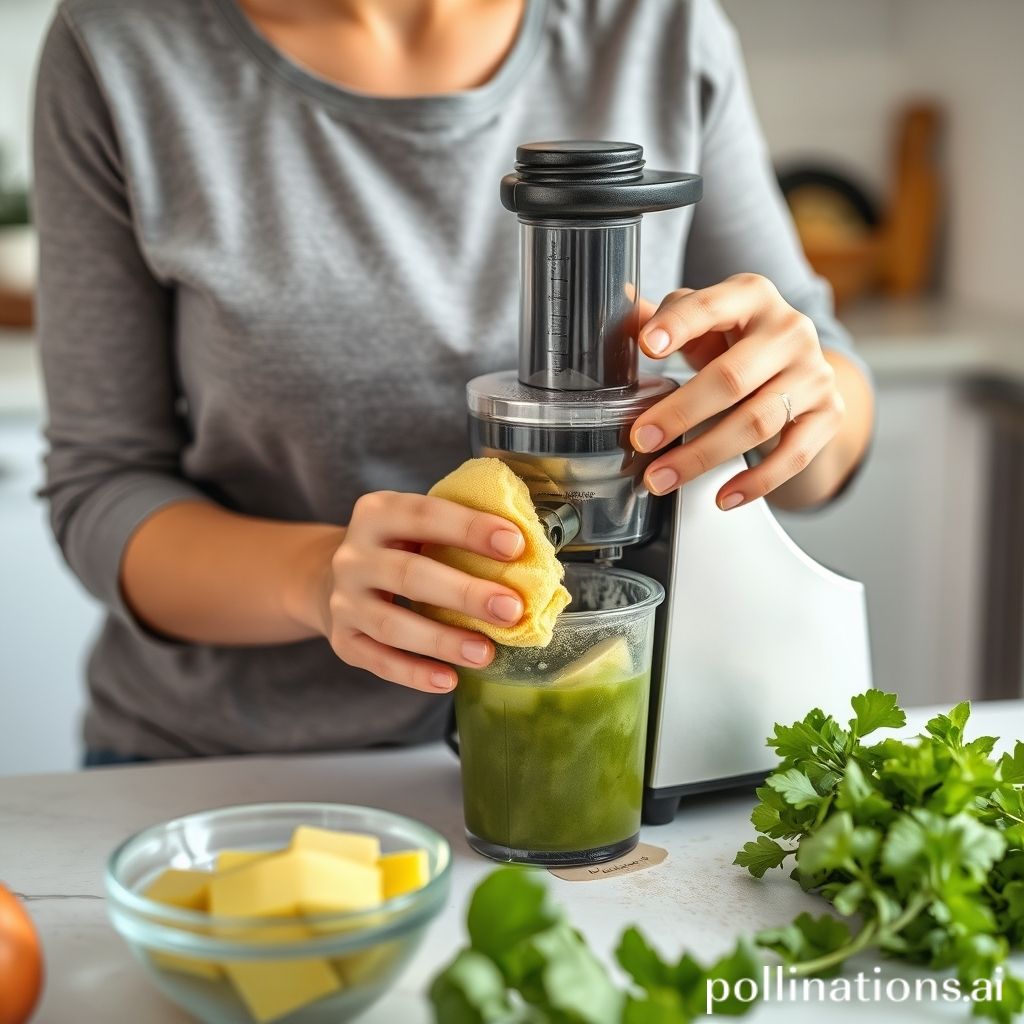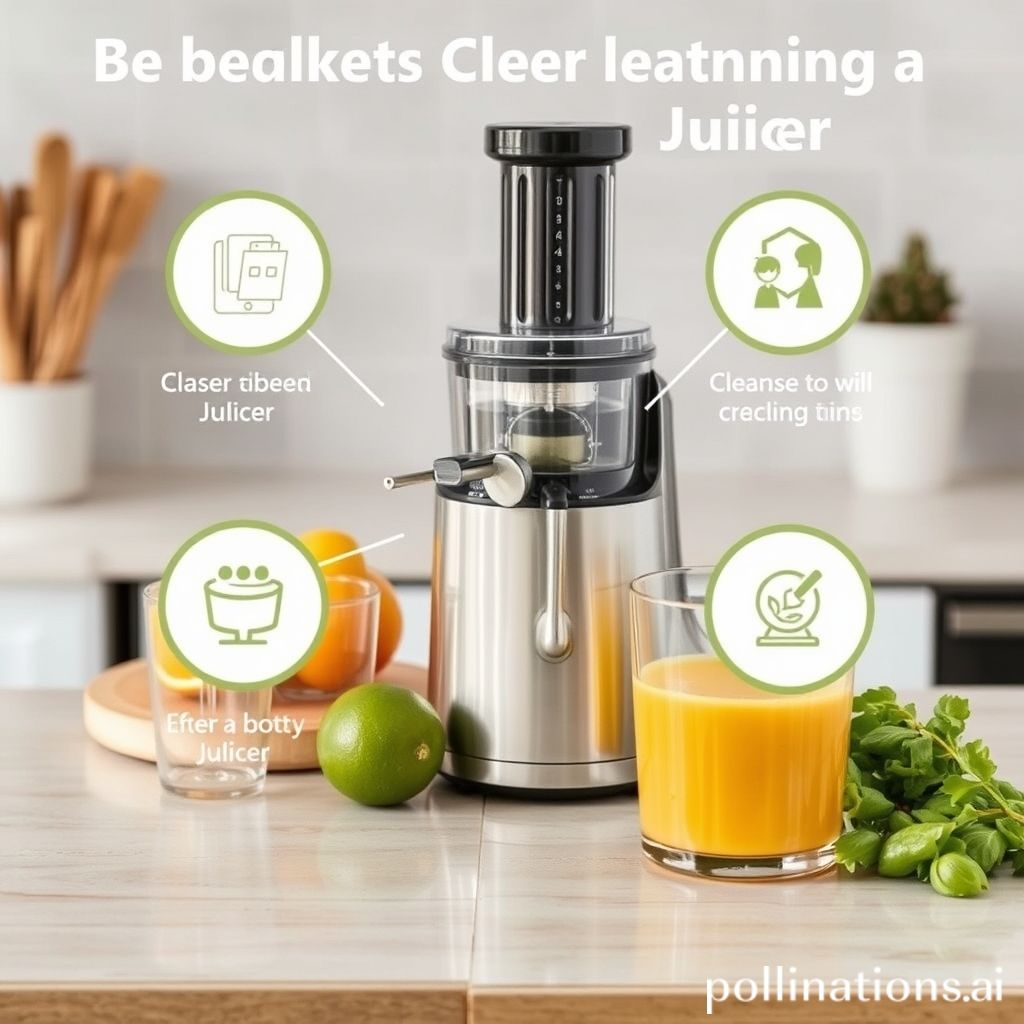Do I Have To Clean My Juicer After Every Use?
In terms of cleaning a juicer, many people are unsure if they need to do it after every use. This is a common question that arises among juicing enthusiasts.
During it may seem like a tedious task, cleaning your juicer after each use is crucial for maintaining its performance and ensuring your safety. In this article, we will delve into the importance of cleaning your juicer regularly and answer the question of whether it can be skipped occasionally. So, if you’re ready to learn more about juicer maintenance, keep reading!

Table of Contents
The Significance of Cleaning a Juicer
It is essential to clean your juicer regularly after each use for several reasons. Not only does it promote hygiene and prevent the growth of bacteria, but it also maintains the quality of your juice and prolongs the lifespan of your juicer.
1. Ensuring Hygiene and Preventing Bacteria Growth
Keeping your juicer clean after every use is crucial for maintaining hygiene. The juicing process involves extracting juice from fruits and vegetables, which may contain dirt, pesticides, or other contaminants. If you neglect to clean your juicer, these residues can create an environment for harmful bacteria to thrive, which can pose health risks. By thoroughly cleaning your juicer, you eliminate any potential sources of contamination and ensure that the juice you consume is clean and safe.
2. Preserving the Quality of Juice
By cleaning your juicer after each use, you help preserve the quality of the extracted juice. Over time, if the juicer is not adequately cleaned, residual pulp, fibers, or juice remnants can accumulate and affect the taste, texture, and freshness of the juice. Cleaning the various components of the juicer, including the blades, filters, and containers, removes any remaining debris, ensuring that each batch of juice is fresh, flavorful, and free from any unwanted flavors or odors.
3. Extending the Lifespan of the Juicer
Regular cleaning also significantly contributes to extending the lifespan of your juicer. The build-up of pulp, fibers, and other residues can lead to clogging, impacting the juicer’s performance and potentially causing damage to its parts. By cleaning your juicer after every use, you prevent the accumulation of debris and maintain optimal machine functioning. This not only ensures consistent juicing results but also extends the lifespan of your juicer, saving you from the need for frequent repairs or replacements.
In conclusion, cleaning your juicer after each use is vital for maintaining hygiene, preserving the quality of juice, and prolonging the lifespan of your juicer. By amalgamating this simple practice into your juicing routine, you can enjoy safe and delicious juice Meanwhile ensuring the long-term functionality of your juicer.
Expert Tips: Clean your juicer after each use to ensure hygiene, preserve juice quality, and extend its lifespan. Safe and delicious juice guaranteed!Do I Have To Clean My Juicer After Every Use?
Steps to Clean a Juicer After Each Use
It is important to clean your juicer after each use to maintain its performance and longevity. Follow these simple steps to ensure a thorough cleaning:
- Disassemble the Juicer: Start by carefully disassembling all the removable parts of your juicer. This includes the pulp container, juice collector, and any other detachable components. Refer to your juicer’s manual for specific disassembly instructions.
- Rinse the Parts with Warm Water: Once the juicer is disassembled, rinse each part under warm running water. This will help remove most of the pulp and juice residue. Make sure to rinse both the interior and exterior of the parts.
- Use a Brush or Sponge for Stubborn Residue: In some cases, certain parts of your juicer may have stubborn residue that cannot be easily removed with water alone. If this happens, use a brush or sponge to gently scrub the affected areas. Avoid using abrasive materials that may scratch or damage the juicer.
- Dry and Store the Parts Properly: After cleaning, always make sure that the juicer parts are completely dried before reassembling or storing them. Moisture left on the parts can cause mold or bacteria growth. You can use a clean towel or air-dry the parts to speed up the drying process. Once dry, store the parts in a clean and dry place until your next use.
| Step | Description |
|---|---|
| 1 | Disassemble the Juicer |
| 2 | Rinse the Parts with Warm Water |
| 3 | Use a Brush or Sponge for Stubborn Residue |
| 4 | Dry and Store the Parts Properly |
Advantages of Cleaning a Juicer After Every Use
1. Prevents Flavor Contamination
By cleaning your juicer after each use, you can avoid flavor contamination. If the juicer is not properly cleaned, leftover pulp, fibers, and juice residues can mix with the new batch of juice, resulting in an unpleasant taste and altering the flavors of your fresh juice. Thoroughly cleaning your juicer ensures that each juice you make maintains its original flavor profile.
2. Avoids Clogging and Malfunctioning
Regularly cleaning your juicer after every use prevents clogging and malfunctioning. Over time, pulp and fibers can accumulate in the juicer’s components, such as the mesh filter or the auger, which can lead to reduced performance and potential breakdowns. Cleaning these parts ensures proper functioning and prevents any blockages that could hinder the juicing process.
3. Simplifies the Juicing Process
Cleaning your juicer immediately after each use simplifies the overall juicing process. Freshly extracted juice can leave behind sticky residues that become harder to remove if left unattended. By promptly cleaning your juicer, you can easily rinse away any remnants, preventing them from drying and sticking to the juicer’s parts. This saves you time and effort when cleaning and allows for a smoother juicing experience.
Regularly cleaning your juicer after each use not only ensures the quality and taste of your juice but also extends the lifespan of your juicer. By maintaining proper cleaning practices, you can enjoy delicious and healthy juice every time without any concerns of contamination or malfunctioning.

When Can Cleaning be Occasionally Skipped?
During it is generally recommended to clean your juicer after each use, there are certain situations where cleaning can be skipped occasionally. Here are a few scenarios where you may consider skipping the cleaning process:
1. Lack of Time and Convenience
If you find yourself pressed for time or in a hurry, it may be tempting to skip cleaning your juicer. Notwithstanding, it is important to note that regular cleaning helps maintain the performance and longevity of your juicer. If you frequently face time constraints, consider investing in a juicer with dishwasher-safe parts or opt for a quick rinse to remove any immediate debris.
2. Opting for Single Ingredient Juices
When you are juicing a single ingredient, such as apples or carrots, cleaning your juicer can be less of a hassle. Single ingredient juices tend to have less residue and are easier to clean compared to juices with a combination of fruits and vegetables. During you may still want to give your juicer a quick rinse, a thorough cleaning may not be necessary in this case.
3. Using the Same Ingredients for Multiple Juices
If you are planning to make multiple juices using the same ingredients, you can consider skipping the cleaning process between each batch. For example, if you are making a carrot and apple juice followed by a beet and celery juice, you can simply remove any large debris or pulp and continue juicing. Notwithstanding, it is important to note that if you are using ingredients with strong flavors or colors, such as beets or dark leafy greens, it is recommended to clean your juicer to prevent any cross-contamination.
Remember, During occasionally skipping cleaning may be acceptable in certain situations, regular cleaning is essential to maintain the hygiene and performance of your juicer. It is always recommended to follow the manufacturer’s instructions for proper cleaning and maintenance.
| Information |
|---|
| Regular cleaning helps maintain the performance and longevity of your juicer. |
| Invest in a juicer with dishwasher-safe parts or opt for a quick rinse to save time. |
| Single ingredient juices are easier to clean compared to mixed juices. |
| Thoroughly clean your juicer when using ingredients with strong flavors or colors. |
| Follow the manufacturer’s instructions for proper cleaning and maintenance. |
Consequences of Infrequent Cleaning
1. Accumulation of Residue and Bacteria
When you fail to clean your juicer after each use, residue from fruits and vegetables can build up over time. This residue can become a breeding ground for bacteria, potentially resulting in foodborne illnesses. Bacteria such as E. coli and Salmonella thrive in moist environments, and the leftover juice and pulp can provide the perfect conditions for their growth. Regular cleaning prevents residue buildup and ensures the safety of your juicer.
2. Decline in Juice Quality
If you do not clean your juicer regularly, the residue left behind can impact the taste and quality of your juice. Over time, the accumulated residue can mix with new batches of juice, leading to an unpleasant flavor and texture. Additionally, the residue can oxidize and cause the juice to spoil more quickly. Cleaning your juicer after each use helps maintain the freshness and purity of your juice, ensuring a delightful and nutritious experience.
3. Damage to the Juicer’s Motor
Skipping cleaning sessions can also harm the motor of your juicer. The residue that accumulates on the various parts of the juicer can seep into the motor, forcing it to work harder and potentially overheat. This can result in motor malfunctions or even permanent damage. Regular cleaning not only keeps your juicer in optimal working condition but also prolongs its lifespan.
Conclusion
Cleaning your juicer after every use is essential for maintaining its performance and longevity. Whilst it may be tempting to skip the cleaning process occasionally, doing so can lead to buildup of residue, bacteria growth, and even affect the taste of your juice.
Regular cleaning ensures that your juicer remains hygienic, preventing any potential health risks. By dedicating a few minutes after each use to clean your juicer thoroughly, you can enjoy fresh and healthy juices for years to come. So, make it a habit to clean your juicer after every use and reap the benefits of a well-maintained appliance.
Frequently Asked Questions about Cleaning Juicers
FAQ 1: Can I clean my juicer parts in a dishwasher?
Yes, most juicer parts are dishwasher safe. Despite this, it is recommended to check the manufacturer’s instructions before placing the parts in the dishwasher. Some delicate or specific parts may require handwashing to prevent damage.
FAQ 2: How often should I deep clean my juicer?
For optimal performance and hygiene, it is recommended to deep clean your juicer after every use. This involves disassembling the juicer and cleaning each part thoroughly. Regular deep cleaning prevents buildup of residue and ensures the juicer remains in top condition.
FAQ 3: Is it safe to use cleaning agents on my juicer?
Yes, it is safe to use cleaning agents on your juicer. Mild dish soap or a mixture of water and vinegar can be used to clean the juicer parts. Despite this, it is important to rinse the parts thoroughly with water after using any cleaning agents to remove any residue.
FAQ 4: Can I leave my juicer parts to air dry?
Yes, you can leave your juicer parts to air dry after cleaning. Despite this, it is recommended to towel dry the parts to prevent water spots or mineral deposits from forming. Additionally, ensure that all parts are completely dry before reassembling the juicer.
FAQ 5: Are there any alternative cleaning methods for juicers?
Yes, there are alternative cleaning methods for juicers. Some juicers come with cleaning brushes that can help remove stubborn residue. You can also soak the juicer parts in warm soapy water for a few minutes before scrubbing them. Additionally, using a food-safe citric acid solution can help remove mineral deposits and stains from the juicer parts.
Read Similar Post:
1. Juice Carrots Without a Juicer: Alternative Methods and Household Appliances
2. Juicer Secrets: Ingredients to Avoid for Optimal Performance and Taste


